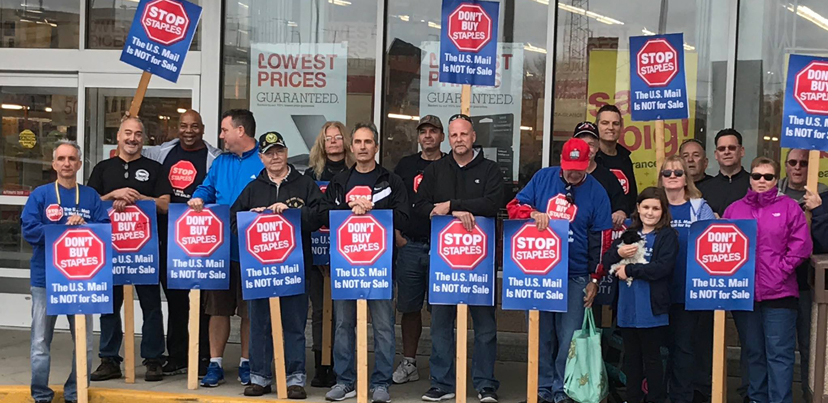How We're Surviving Right to Work: Boston Postal Workers Use Grievances to Build the Union

Some unions in right-to-work states and sectors have high percentages of workers signed up as members. How do they do it? Photo: Local 100 Staples Boycott
Dispatches from the Front Lines of Right to Work
The open shop is the rule for private sector workers in 28 “right-to-work” states, for public sector workers in 25 states, and for federal workers all over this country. That means workers covered by a union contract get to enjoy the benefits of representation without being members or paying dues.
But even in states and sectors where membership is legally optional, some unions have high percentages of workers signed up as members. How do they do it? This month we asked union leaders representing:
For a short exercise to help your union start preparing to survive an open shop click here.
Federal-employee unions are all open shop. Yet the Postal Workers (APWU) Boston Metro Area Local, representing 2,100 workers, hovers around 94 percent membership.

“I think the key is get to them as often as you can, early in their career,” says General President Scott Hoffman. At each new-hire orientation, a representative walks new hires through the benefits the union has won. A week later there’s another chance, at the training session for window clerks. “We ask who still hasn’t joined or had anybody talk to them,” Hoffman says. “Try to get as many bites at the apple as you can in the beginning.”
TEAM UP
To keep people in the union, Hoffman says, you have to get them involved. When someone brings in a grievance, for instance, it’s a mistake for the steward to treat the member like a lawyer treats a client: “‘Okay, thanks for telling me the problem,’ then they leave the office and it's all in the steward's hands.”
Instead the steward should work through the grievance with the worker as a teammate. “Sometimes you have to explain, ‘No, that’s not going to work,’ and why,” Hoffman says, “but when they feel they’re part of the process, they seem to be happier with the knowledge that the union’s trying the best they can. They’re in it with you.”

SUPPORT LABOR NOTES
BECOME A MONTHLY DONOR
Give $10 a month or more and get our "Fight the Boss, Build the Union" T-shirt.
Treat each grievance like it matters. A case may be old hat to a steward or officer who has handled a hundred similar cases, but “it’s not old hat to the member,” Hoffman says. “It’s the first time they got screwed like that.”
Stewards should advance the grievance through the steps quickly, so that workers see results as soon as possible. “Timeliness is huge,” Hoffman says. If a member has wrongly lost a day’s pay, for instance, you want to win back pay “while the injury is still fresh,” showing that the union took the issue seriously.
“When you lollygag and handle it as so routine that somebody doesn’t get that day’s pay till five or six months later,” Hoffman says, “the effect is ‘Eh,’ because the sting has worn off and the union didn’t take it personally.”
Even when you lose a grievance, Hoffman says, it’s important that the affected member understand why. “Members don’t demand a victory every time,” he says. “They just want to see that you made the effort.”
BEAT BACK FEAR
Tips from Boston Postal Workers
- Starting at orientation, ask workers early and often to join the union.
- Walk around the workplace regularly, giving fearful workers the chance to approach you with their problems or testimony.
- Advance grievances quickly, and involve the affected member in the process. Whenever possible, make it a class-action grievance and have members submit their own statements.
- Vigorously defend union stewards and anyone else the boss retaliates against.
- Mix up union meeting times—weekend mornings, weekday evenings—so more people can participate.
- What to say: “Mention what the Postal Service had offered on the table previously, and tell them, but for the grace of the union, you’re not making that, you’re making this.”
When the boss tries to make an example of someone who stood up for themselves or others, it’s crucial to defend that person. “People live in fear of retribution,” Hoffman says. “You better be aware of retribution and jump in hard on those cases. Especially if you have a good hand to play, play it as hard as you can, and quick.
“If they attack a steward, you drop what you’re doing and get in on that issue. Because the members are looking, and if they see that the stewards are getting pushed around, they think, ‘then what chance do I have?’”
The union also involves members in bigger campaigns. In the APWU’s three-year boycott against the retail chain Staples, where low-wage non-union workers were doing outsourced postal work, the Boston local was perhaps the most active in the country—leafleting outside stores four to six days a week and turning out members to picket the chain’s headquarters.
In January the Postal Service and Staples agreed to end their relationship. “When we won,” Hoffman said, “even some of the naysayers who were like, ‘What’s this group of ragtag bums, how are they ever going to change something as big as that?’—some of those fence-sitters came forward and recognized it. The ones that didn’t get involved will be more involved when we send the flare up the next time.”






